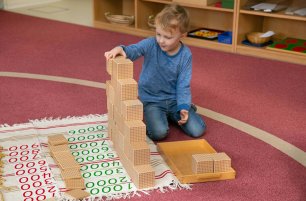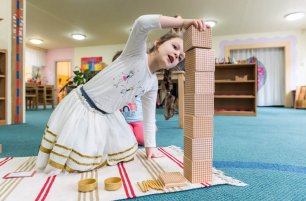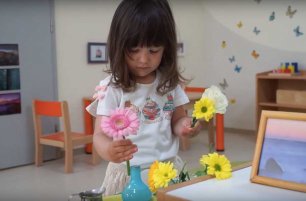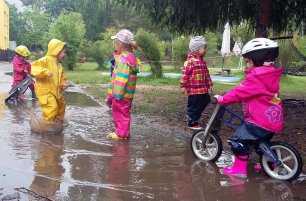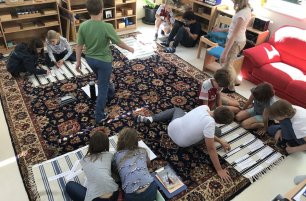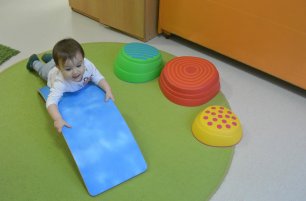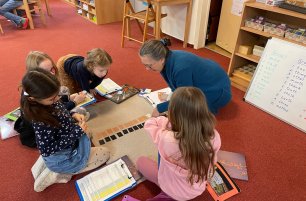Learning Mathematics in our Primary Classrooms
Maria Montessori often stated that not only does every human being have an innate drive to understand the environment around them, we all also naturally have what she called a “Mathematical Mind”. In the Montessori classroom, mathematical learning begins through indirect preparation long before a child is ever introduced to any Math materials.
A three-year-old child will work with many materials from the Practical Life area and the Sensorial area first, which will help them develop their sense of order, concentration, coordination and focus. At the same time, a child will directly experience the concepts of sequencing, correspondence, categorizing and grading, all of which will help them connect and categorize the world around them – and prepare them for mathematic study later on.
Children under six years of age are in their first plane of development, which means their main focus is still collecting information and impressions of the world surrounding them. The sensitive periods of this period allow them to focus their attention to various aspects of the environment. Through the power of the Absorbent Mind, utilizing observation, imitation and hands-on experience, they are able to take in vast quantities of information. Of course, for this to happen, the child must be given the right resources to help with their psychic development.

After joining IMSP and learning more about Montessori, the one question that baffles me is why don’t we all learn Mathematics the Montessori way? In our Math curriculum, each material is presented with joy, order and precision, giving the child a concrete concept that they can then experiment with and exercise. Like in everything else, the lessons build upon each other, allowing the child to practice and progress depending on their own readiness. They experience the curriculum as a series of discoveries, which leads to a natural comprehension and confidence in Math.
In the scope and sequence of Math, concrete impression and understanding is the foundation to every lesson, before moving towards abstract comprehension. We begin with the concept of quantities and symbols from one to nine, followed by ten, and the concept of zero. The child explores quantities and their symbols with materials such as the Red and Blue rods, Sandpaper Numerals, Spindle Box and the Cards and Counters before going on to practice and solidify these concepts in various extensions.
When a child is ready, and has a clear concept of the initial quantities, they will be introduced to the decimal system using the Golden Bead material. This allows them to come to an understanding of place value and link the concepts of units, tens, hundreds and thousands. You will often see this eye-catching material in the updates on Transparent Classroom! It is named after its unit, the golden bead; there is a number of them, all in the same size. Ten beads strung on a wire make a ten bar, one hundred is a square made up of ten-bars side by side, and one thousand is ten one-hundred-squares stacked on top of each other to form a cube. This is also where a child starts to understand the concept of exchanging and equality, that ten units is equal to one ten, ten of the ten-bars is equal to a hundred, and ten hundred-squares is equal to a thousand. We often observe in the classroom that children enjoy working with laying down the large numeral cards for 1, 10, 100, and 1000 and accompanying them with the golden bead representation. By doing so, they can easily comprehend the concept of hundreds and thousands.
The Montessori Math curriculum is of course not a straight line. It is common to introduce the decimal system work first, before linear counting, as it gives the child a bigger picture of our number system and allows them to develop a mental representation of place value in ways that the linear counting work cannot reinforce until much later in the sequence. Parallel to this, many children will begin exploring and working on teen numbers and digits with tens with the Teen Boards, Ten Boards and later on also the Hundred Board to strengthen the correlation between symbols and names - after understanding the concrete part of quantities.

From then on, children will be exposed to operational values, skip-counting with the colored bead chains, and finally arrive at a more abstract phase of equations and memorization.
The Math area is highly precise and exacting, giving children the opportunity for success following the scope and sequence at their own pace. Mathematics is an abstraction of the world and children are naturally curious about the science of number as they try to make sense, and deepen their understanding, of their environment. When properly encouraged alongside this curriculum, guided by a teacher led by diligent observation of the child’s interest as well as ability, any child can find great joy and satisfaction in this area of study.
By Caryn Khoo
Want to learn more? Read our next article:

